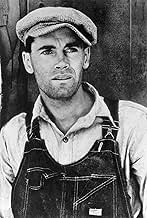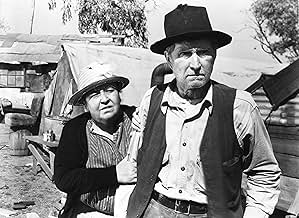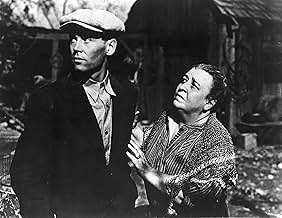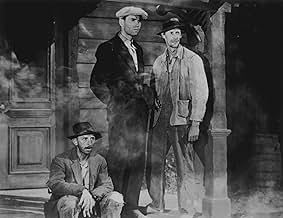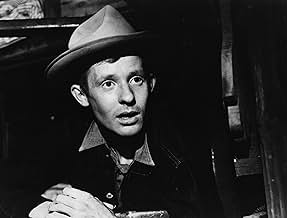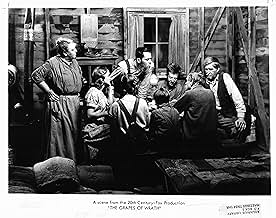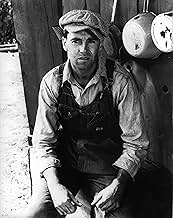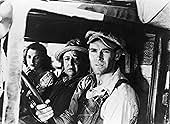Una familia pobre del Medio Oeste se ve obligada a abandonar sus tierras. Viajan a California, sufriendo las desgracias de las personas sin hogar en la Gran Depresión.Una familia pobre del Medio Oeste se ve obligada a abandonar sus tierras. Viajan a California, sufriendo las desgracias de las personas sin hogar en la Gran Depresión.Una familia pobre del Medio Oeste se ve obligada a abandonar sus tierras. Viajan a California, sufriendo las desgracias de las personas sin hogar en la Gran Depresión.
- Dirección
- Guionistas
- Elenco
- Ganó 2 premios Óscar
- 13 premios ganados y 6 nominaciones en total
- Dirección
- Guionistas
- Todo el elenco y el equipo
- Producción, taquilla y más en IMDbPro
Resumen
Opiniones destacadas
Henry Fonda plays the part of Tom Joad, a young member of the family who is released from prison at the beginning of the film, only to find that his family has been driven from their home and is staying at his uncle's house until they can figure out what to do about their sudden homelessness. It is by pure coincidence that Tom was released early on good behavior, otherwise he may very well never have seen his family again. He finds them in a state of near desperation, as they begin more and more to realize the predicament that they are in. Their trek across half of the country, on their way to California to assume jobs that they've heard about, provides for a substantial portion of the plot and is extremely well-structured.
The family encounters every hardship imaginable on this journey, from family members dying to their struggle to feed themselves to their rickety old truck constantly breaking down. They run into disillusioned people who claim that they've been to California and there are really no jobs there, at least not nearly as many as there are people going to look for them. They are periodically and derogatorily referred to as `Okies,' a term which places them in a broad category of poor folks driven from there homes in middle America who are traveling to the coast to get jobs that aren't there. There is so much doubt and hardship presented that it is never really certain whether they really will find jobs. The audience is never able to assume a happy ending, because there is so much contrary foreshadowing throughout the film.
The struggles do not abate once the family reaches California and takes up shaky residence in residential areas that would be more accurately referred to as shanty towns, and the rest of the film is dominated by the family's efforts to survive in a new and unfamiliar place, while working for wages that are barely sufficient to prevent starvation. Ma Joad spends the majority of the film stressing the importance of keeping the family together, seeing it as the only thing that they really had left, but this is eventually set aside in favor of each member of the family not only surviving but also flourishing, which provides for one of the many powerful messages that the film delivers.
The Grapes of Wrath is not exactly an edge of your seat film, but it is a shockingly realistic portrayal of the suffering that so many people and families experienced during the Great Depression. The performances are flawless, and the experience is not only powerful and moving but also educational. It's no secret that most people do not watch movies to learn, but there comes a point, at least once in a great while, when a person should watch a film that requires a little mental thought processing, and in such cases, The Grapes of Wrath is an excellent choice.
For most of America the Depression started with the stock market crash of 1929. But for the farmers it really began at the end of World War I. Those were good years for agriculture, the war in Europe was a boom for agriculture. But when farm prices dropped after the Armistice, a whole lot of family farms went belly up. Lots of people left the farms for the big city and industry jobs. The Depression years unhappily coincided with some of the worst drought ever seen in America.
This is what many families like the Joads were facing in 1939 when the book was written. The banks had foreclosed on land that had withered to dust in any event. Folks like the Joads picked up and moved elsewhere, like California on a rumor of prosperity and jobs.
America was still changing from an agricultural to an industrial society back then. That causes a lot of trouble for people unskilled in any industrial job training. As a country we're going through something similar today in many areas. We're moving from an industrial to an information based economy. Industry jobs are being lost to other nations and older and poorer workers are suffering for it. It's progress I guess, but it takes its toll.
Some factory worker who has lost his job for any number of reasons can identify to some degree with the Joads, especially if they've lost a home they owned. For the Joads it was worse because they made their living off the land for many generations, identifying with it in a way that industrial workers could not.
Henry Fonda got his first Oscar nomination for Tom Joad. To get the part which he knew he was so right for, he signed a studio contract with 20th Century Fox. That caused him many problems later on, but those are stories for another film review.
Tom Joad is a midwest country kid, a whole lot like Fonda himself. Part of the story of The Grapes of Wrath is Tom himself trying to figure out why these economic forces are crushing him and his family and the way of life he's known. In the end when he leaves the Joad family and hits the open road, he's not got all the answers, but he's asking the questions. Tom hasn't figured it out, but a lot of people with many letters after their names haven't either. He only knows that he's got to get in the fight for economic justice.
Jane Darwell was in films from the earliest silent films to Mary Poppins in 1965. This became her career part and the mother role of all time. She's what holds the Joad family together in good times and bad. That's what moms do and get little recognition for it. Except in this case by the Motion Picture Academy.
John Carradine has his career part in this also. Another John Ford favorite, Carradine plays Casy the defrocked preacher who as he tells it disgraced himself with a female parishioner. After that preaching the gospel didn't seem quite right. When Fonda meets Carradine after Fonda's been released from prison, Carradine is asking a lot of questions about what is man's place in the metaphysical scheme of things. He's developing what we would now call situational ethics. Carradine's questions are on a higher plane, but he certainly inspires Fonda to ask for some answers himself.
The Grapes of Wrath illustrates that at least government can give first aid in a crisis. After being in privately run agricultural camps where they're treated like less than dirt, the Joads happen upon a camp run by the Department of Agriculture where at least they're treated like humans. As it turns out, the Secretary of Agriculture was one Henry A. Wallace who was running for Vice President that year with Franklin D. Roosevelt. I'll bet any number of people saw The Grapes of Wrath and saw a message of support for FDR and the New Deal.
Given some of the problems of the American economy today, The Grapes of Wrath though it appears dated isn't really all that much a relic of our past. It's both a timeless book and a timeless classic film.
Besides Fonda and Darwell, the supporting cast features plenty of good supporting players, including Charley Grapewin and John Carradine. All of them make their characters come alive believably. They also fit together well and complement one another's performances, which accentuates the themes involved in the struggles of the Joad family.
For all that the Steinbeck novel is so revered, and for all that his story is an often compelling depiction of its characters, with whom many in the era could identify, it would have been better if it had not been so heavy-handed. Even given that the times were bad, more balance in the characters outside of the family, and in the Joads' experiences, would have made it an even better story. Certainly, this is barely even noticeable when compared with the stories in many present-day movies and novels, which often dispense with any attempts at plausibility.
And that does not stop this adaptation from being a worthwhile and often moving film. Ford clearly appreciated the potential in the material, and he and the cast work together to make each character count, and to give meaning to each scene.
I think their must have been more then one car because ours was full of stuff in the back seat, clear up almost to the roof. Frankie, Bill and me (my brothers) all was on top of the stuff in the back seat, had to stay lying down was not enough room to set up. What I remember most about the trip was it was awful hot when we went through Arizona and we had not much water, the water we had was in a canvas bag, hooked to the front bumper to help keep it cool. We did not get much because dad was saving it for the car when the car got to hot. Mom told us to suck on pebbles, and we did. It was a bad time every where. No jobs or anyway to make any money.
We were going to California because their was suppose to be some picking work their, after we got to California we saw miles of potatoes all loose piled up high my guess would be about six feet high, they had put lime or something that looked like lime it was a white powder to keep people from taking them to eat.
We found a place to pick plums that they used to make prunes and we lived in a Quonset hut made of corrugated metal setting on a concrete slab. The public toilets were near were we stayed, Joe and his wife (Family friends)had their own Hut this was the time that dad & Joe would sell tickets for people to watch them box each other in a ring at the recreation hall on the property. Also they joined a baseball team and played baseball, dad played left field. We got to watch them play for free.
Seems like Frankie and I played together a lot don't think Bill did because he was still a baby his self, Doris and Dorothy (my sisters) was still crawling so Bill could not have been very old at that time. Frank & I would go pick up plums off the ground and we would bring them home, Doris and Dorothy would set in the box and eat them. You can guess what they would look like when mom and dad got home, their was no air condition back then so they would take a hose and squirt water on the tin Quonset hut to try and cool it off some, I know when we went west we looked like those grapes of wrath folks in the movie.
That area was the first time I ever saw a frog walk, it was to hot for them to hop, when they tried to hop their bellies would touch the ground ( gravel) and would burn them, any way that's what we thought at that time. I saw the movie of Grapes of wrath a long time ago, and I remember it so well, I cried most of the time it was on because it reminded me of the hard time we all had back then, I was born in Oklahoma and it was just a terrible time in the late thirties I would love to see the movie again, its to me a history of my family, I am 71 1/2 years old now and still remember it very clearly.
Gene McDaniel
¿Sabías que…?
- TriviaPrior to filming, producer Darryl F. Zanuck sent undercover investigators out to the migrant camps to see if John Steinbeck had exaggerated about the squalor and unfair treatment meted out there. He was horrified to discover that Steinbeck had actually downplayed what went on in the camps.
- ErroresThe character, Noah (Frank Sully), after he's seen playing with his boat in the river, simply drops out of the story without any explanation, and does not appear again. In the book there is a brief reference to him going off on his own, but no explanation, whatever, is given in the film for his departure.
- Citas
Tom Joad: I been thinking about us, too, about our people living like pigs and good rich land layin' fallow. Or maybe one guy with a million acres and a hundred thousand farmers starvin'. And I been wonderin' if all our folks got together and yelled...
Ma Joad: Oh, Tommy, they'd drag you out and cut you down just like they done to Casy.
Tom Joad: They'd drag me anyways. Sooner or later they'd get me for one thing if not for another. Until then...
Ma Joad: Tommy, you're not aimin' to kill nobody.
Tom Joad: No, Ma, not that. That ain't it. It's just, well as long as I'm an outlaw anyways... maybe I can do somethin'... maybe I can just find out somethin', just scrounge around and maybe find out what it is that's wrong and see if they ain't somethin' that can be done about it. I ain't thought it out all clear, Ma. I can't. I don't know enough.
Ma Joad: How am I gonna know about ya, Tommy? Why they could kill ya and I'd never know. They could hurt ya. How am I gonna know?
Tom Joad: Well, maybe it's like Casy says. A fellow ain't got a soul of his own, just little piece of a big soul, the one big soul that belongs to everybody, then...
Ma Joad: Then what, Tom?
Tom Joad: Then it don't matter. I'll be all around in the dark - I'll be everywhere. Wherever you can look - wherever there's a fight, so hungry people can eat, I'll be there. Wherever there's a cop beatin' up a guy, I'll be there. I'll be in the way guys yell when they're mad. I'll be in the way kids laugh when they're hungry and they know supper's ready, and when the people are eatin' the stuff they raise and livin' in the houses they build - I'll be there, too.
Ma Joad: I don't understand it, Tom.
Tom Joad: Me, neither, Ma, but - just somethin' I been thinkin' about.
- Versiones alternativasInternational distributions (e.g. UK) have a short ~30 second prologue at the beginning to explain the historical context to the story to touch on the socio-economic problems in the US which arose during the Great Depression and the concurrent Dust Bowl.
- ConexionesEdited into John Ford, l'homme qui inventa l'Amérique (2019)
- Bandas sonorasRed River Valley
(uncredited)
Traditional
Played during the opening credits and often in the score
Sung by Henry Fonda at the dance
Selecciones populares
- How long is The Grapes of Wrath?Con tecnología de Alexa
- Near the end of the film, Tom's employer shows the workers a flyer talking about "Red agitators" and Tom asks about the meaning of the message -- what's the message?
- What is 'The Grapes of Wrath' about?
- What is an "Okie"?
Detalles
- Fecha de lanzamiento
- País de origen
- Idioma
- También se conoce como
- The Grapes of Wrath
- Locaciones de filmación
- Santa Rosa, New Mexico, Estados Unidos(service station, diner, bridge, train sequence)
- Productora
- Ver más créditos de la compañía en IMDbPro
Taquilla
- Presupuesto
- USD 800,000 (estimado)
- Total a nivel mundial
- USD 7,304
- Tiempo de ejecución2 horas 9 minutos
- Color
- Relación de aspecto
- 1.37 : 1
Contribuir a esta página



